| Srl | Item |
| 1 |
ID:
121399
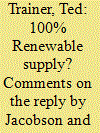

|
|
|
|
|
| Publication |
2013.
|
| Summary/Abstract |
I recently criticised the claim by Jacobson and Delucchi that renewable energy sources could meet world energy demand. Jacobson and Delucchi replied defending their position. This is a response to the main points made in that reply. The main issues are to do with intermittency of renewable energy sources and the implications for redundant plant and storage, vehicle to grid systems as a storage solution, the embodied energy costs of renewable energy, and overall system capital costs. It is argued that Jacobson and Delucchi do not provide satisfactory analyses of these issues and that they do not show that energy supply can be 100% renewable. This discussion is intended to clarify some of the core issues in the debate about the limits of renewable energy.
|
|
|
|
|
|
|
|
|
|
|
|
|
|
|
|
| 2 |
ID:
116716


|
|
|
|
|
| Publication |
2012.
|
| Summary/Abstract |
The current discussion of climate change and energy problems is generally based on the assumption that technical solutions are possible and that the task is essentially to determine the most effective ways. This view relies heavily on the expectation that renewable energy sources can be substituted for fossil fuels. Australia is more favourably situated regarding renewable sources than almost any other country. This discussion attempts to estimate the investment cost that would be involved in deriving Australia's total energy supply from renewable sources. When provision is made for intermittency and plant redundancy it is concluded that the total investment cost is likely to be unaffordable.
|
|
|
|
|
|
|
|
|
|
|
|
|
|
|
|
| 3 |
ID:
126567
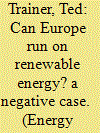

|
|
|
|
|
| Publication |
2013.
|
| Summary/Abstract |
The possibility of 100% renewable supply of European energy is analysed in terms of the amount of redundant plant required to cope with the intermittency of wind and solar energy, and the limited biomass potential. It is concluded that the capital cost would be unaffordable, and that biomass resources are insufficient.
|
|
|
|
|
|
|
|
|
|
|
|
|
|
|
|
| 4 |
ID:
097251
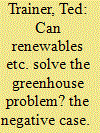

|
|
|
|
|
| Publication |
2010.
|
| Summary/Abstract |
Virtually all current discussion of climate change and energy problems proceeds on the assumption that technical solutions are possible within basically affluent-consumer societies. There is however a substantial case that this assumption is mistaken. This case derives from a consideration of the scale of the tasks and of the limits of non-carbon energy sources, focusing especially on the need for redundant capacity in winter. The first line of argument is to do with the extremely high capital cost of the supply system that would be required, and the second is to do with the problems set by the intermittency of renewable sources. It is concluded that the general climate change and energy problem cannot be solved without large scale reductions in rates of economic production and consumption, and therefore without transition to fundamentally different social structures and systems.
|
|
|
|
|
|
|
|
|
|
|
|
|
|
|
|
| 5 |
ID:
112330


|
|
|
|
|
| Publication |
2012.
|
| Summary/Abstract |
Jacobson and Delucchi have recently put forward a detailed case in support of the claim that renewable energy sources can meet total world energy demand. The following argument is that this proposal is unsatisfactory, primarily because it does not deal effectively with the problems set by the variability of renewable energy sources, and also because its analysis of investment costs is inadequate.
|
|
|
|
|
|
|
|
|
|
|
|
|
|
|
|
| 6 |
ID:
162893
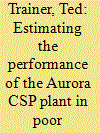

|
|
|
|
|
| Summary/Abstract |
Concentrated Soar Power (CSP) systems can be equipped with capacity to store heat energy enabling generation at night or other times when there is little or no solar irradiation. Proposals for high penetration or 100% renewable energy supply systems therefore often envisage major dependence on the CSP component of the system to help solve the intermittency and storage problems. However there is little evidence on the extent to which this can be done when solar radiation is poor. This study draws on some recently available information to clarify the issue with respect to the proposed Aurora plant for South Australia. It finds that there would be periods of a week or more in which little energy was being produced, and therefore that CSP is unlikely to be capable of making a significant contribution to the storage task in unfavourable conditions.
|
|
|
|
|
|
|
|
|
|
|
|
|
|
|
|
| 7 |
ID:
126588
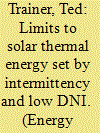

|
|
|
|
|
| Publication |
2013.
|
| Summary/Abstract |
Hourly DNI data from the Australian Bureau of Meteorology over 8 years have enabled analysis of implications for solar thermal power generation systems. Six sites were selected, mostly in central Australia and the occurrence and duration of gaps in the availability of energy inputs to solar thermal generation were tallied. In a three month period late in 2010 12 periods of three or more days with an overall average DNI of 2.3 kWh/m2/day occurred. The relationship between DNI and solar thermal generation efficiency was examined and this indicated that on many more days power output would have been very low or zero. The relation between daily total DNI and hourly average DNI was also found to be important, as a high total might be made up of many hours in which DNI was too low for significant generation. These two factors show that there is a significant problem of intermittency for solar thermal systems. Although the annual output of each plant may be commercially viable a solar thermal system might not be capable of meeting demand reliably.
|
|
|
|
|
|
|
|
|
|
|
|
|
|
|
|
| 8 |
ID:
126822
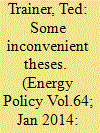

|
|
|
|
|
| Publication |
2014.
|
| Summary/Abstract |
There is a strong tendency for energy technologists and policy analysts to believe that energy demand can be met and associated problems including climate change can be solved, and to focus attention on finding the best technologies to achieve these goals. They tend not to be comfortable with any suggestion that there might be insurmountable limits and insoluble problems, or that the problems they are working on require social solutions rather than technical solutions. Various contributions to this Special Edition provide illustrations. This paper explores some challenges to the dominant Promethian world view. These include a consideration of the magnitude of the energy and other problems, the possibility that renewable energy cannot solve them, the significance of energy and of declining EROI for economic growth, and the possible effects of rising resource input costs and unstable capital markets for energy investment. Finally the ultimate heresy is considered, the possibility that access to abundant energy would not be good for us. In summary, it is suggested that coercive limits to growth are being encountered and that the resulting problems cannot be solved by action on the supply side but will require a radical rethinking of social goals, systems and values.
|
|
|
|
|
|
|
|
|
|
|
|
|
|
|
|
| 9 |
ID:
166349


|
|
|
|
|
| Summary/Abstract |
Blakers et al. claim that pumped hydro storage will enable a 100% renewable electricity supply for Australia. However aspects of their case are questionable and require clarification or confirmation. This study seeks to discuss these, not with the aim of settling questions but of pointing to issues that would require verification before the viability of the proposal could be regarded with confidence.
|
|
|
|
|
|
|
|
|
|
|
|
|
|
|
|